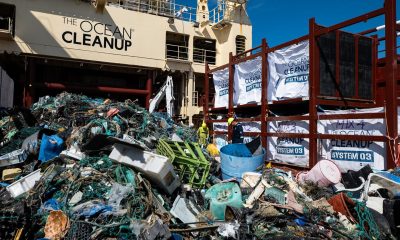Marine Life & Conservation
Whale world record and the power of citizen science

 A sperm whale has been observed in the Azores archipelago in the middle of the Atlantic ocean over a 34 year time span, setting an observation record in the Atlantic and very possibly the world. The observations over this record-breaking time span were made by a combination of scientists and citizen scientists, showing once again the power of this increasingly prominent branch of science.
A sperm whale has been observed in the Azores archipelago in the middle of the Atlantic ocean over a 34 year time span, setting an observation record in the Atlantic and very possibly the world. The observations over this record-breaking time span were made by a combination of scientists and citizen scientists, showing once again the power of this increasingly prominent branch of science.
34 year record
The female sperm whale “19” was first seen in 1987 in the Azores during the research cruises of the International Fund for Animal Welfare. Scientists know she is a female, because she was spotted with several calves over the years. Thirty-four years later she was spotted again by cetacean scientist Lisa Steiner of Whale Watch Azores.
In between she was recorded in 1991, 1994, 2002, 2004, 2006, 2007, 2008, 2015, 2016 and 2021 by a combination of science and citizen science projects. She has not been seen outside of the Azores, but it is possible that her group has travelled to other parts of Macaronesia, like several other groups have.
CSI of the seas
Steiner, who is based on the Azores and has followed whales around the North Atlantic for 33 years, says: “Whale tails (flukes) are like fingerprints. By photographing flukes and then matching them up like a CSI of the seas, we can trace the movements of the animals. Being able to follow an animal for 34 years is amazing and once again shows the power of long-term datasets.” The significance of such findings goes well beyond mere scientific curiosity, however. As Steiner explains, “hearing the histories of individual whales catches the public’s imagination, because personal stories are much more interesting to the general public than generalisations, leading to increased interest and support. That support is priceless when protections for animals are being considered”.
Death and conservation
One example is whale “3418”, also a sperm whale, who was killed by a high-speed ferry in the Canaries. He had been seen for 15 years in the Azores, beginning when he was still a calf, before making the trip to the Canary Islands. His tragic and premature death is being used to promote speed limits of the high-speed inter-island ferries around the Canaries.
Citizen science gathers valuable data
Citizen science is defined as public participation in scientific research. Outcomes are often advancements in scientific research, as well as an increase in the public’s understanding of science. In nature conservation in particular, international citizen science has become increasingly important as a duel stream of data and funding. An example of this, citizen scientists of Biosphere Expeditions (an international non-profit NGO at the forefront of wildlife conservation powered by citizen science) have worked with Steiner on an annual Azores expedition since 2004 and contributed to this record-breaking fluke dataset.
Dr. Matthias Hammer, founder and executive director of Biosphere Expeditions, says the NGO “is proud to have contributed a piece of the puzzle to this Atlantic or possibly world record. This shows again how citizen science is part of the solution. This recent achievement is just the latest in a long line of citizen science contributions since our foundation in 1999, such as the creation of protected areas on four continents, amongst many others. Thank you to all our citizen and professional scientist, as well as all the other helpers over the years.”
For more information about Biosphere Expeditions visit their website by clicking here.
Header image: Sperm whale and calf (c) Gabriel Barathieu
Blogs
The Ocean Cleanup Breaks 10,000,000 KG Barrier

The Ocean Cleanup, the global non-profit project, has removed a verified all-time total of ten million kilograms (22 million lbs.) of trash from oceans and rivers around the world – approximately the same weight as the Eiffel Tower.
To complete its mission of ridding the oceans of plastic, The Ocean Cleanup uses a dual strategy: cleaning up the Great Pacific Garbage Patch (GPGP) to remove the plastic already afloat in the oceans, while stopping the flow of plastic from the world’s most polluting rivers.
Through cleaning operations in the GPGP and in rivers in eight countries, the cumulative total of trash removed has now surpassed ten million kilograms. This milestone demonstrates the acceleration of The Ocean Cleanup’s impact, while underlining the astonishing scale of the plastic pollution problem and the need for continued support and action.
While encouraging for the mission, this milestone is only a staging point: millions more tons of plastic still pollute our oceans and The Ocean Cleanup intends to continue learning, improving and innovating to solve this global catastrophe.
This announcement comes as governments from around the world meet to continue negotiations to develop a new legally binding instrument to end plastic pollution at INC4 in Ottawa, Canada. Representatives of The Ocean Cleanup will be in attendance and the organization will be urging decision-makers to collaborate towards a comprehensive and ambitious global treaty which addresses plastic at all stages of its life cycle and in all marine environments worldwide, including in areas beyond national jurisdiction.
It is encouraging to see that the need for remediation is reflected in the various options for potential treaty provisions. It is essential that the final treaty contains clear targets for the remediation of legacy plastic pollution, and reduction of riverine plastic emissions.
Tackling plastic pollution requires innovative and impactful solutions. The treaty should therefore incentivize the innovation ecosystem by fostering innovations that make maximal use of data, technology and scientific knowledge – such as those designed and deployed by The Ocean Cleanup.
‘After many tough years of trial and error, it’s amazing to see our work is starting to pay off – and I am proud of the team who has brought us to this point.’ said Boyan Slat, Founder and CEO of The Ocean Cleanup. ‘While we still have a long way to go, our recent successes fill us with renewed confidence that the oceans can be cleaned.’
The Ocean Cleanup was founded in 2013 and captured its first plastic in 2019, with the first confirmed catch in the GPGP coming soon after the deployment of Interceptor 001 in Jakarta, Indonesia. After surpassing one million kilograms of trash removed in early 2022, the non-profit project has since progressed to the third iteration of its GPGP cleaning solution, known as System 03, and a network of Interceptors currently covering rivers in eight countries, with more deployments set for 2024.
About The Ocean Cleanup
The Ocean Cleanup is an international non-profit organization that develops and scales technologies to rid the world’s oceans of plastic. They aim to achieve this goal through a dual strategy: stemming the inflow via rivers and cleaning up the legacy plastic that has already accumulated in the ocean. For the latter, The Ocean Cleanup develops large-scale systems to efficiently concentrate the plastic for periodic removal. This plastic is tracked and traced through DNV’s chain of custody model to certify claims of origin when recycling it into new products. To curb the tide via rivers, The Ocean Cleanup has developed Interceptor™ solutions to halt and extract riverine plastic before it reaches the ocean. Founded in 2013 by Boyan Slat, The Ocean Cleanup now employs a broadly multi-disciplined team of approximately 140. The foundation is headquartered in Rotterdam, the Netherlands.
For more information, visit: theoceancleanup.com and follow @theoceancleanup on social media.
Marine Life & Conservation
Steve Backshall to headline Shark Trust’s flagship event: For the Love of Sharks

Join a host of amazing, shark loving, speakers including Steve Backshall and the Shark Trust team for an evening celebrating shark conservation at the Royal Geographical Society in London this November.
Date: 29th November 2024
Time: 6-10pm
Location: Royal Geographical Society, London
Tickets: https://www.sharktrust.org/Event/flos24
The event will be a celebration of all things shark. Those lucky enough to get hold of tickets will hear from engaging guest speakers with a passion for sharks.
The line-up includes (*subject to change if unforeseen circumstances arise)
Steve Backshall: One of television’s busiest presenters, BAFTA award-winning wildlife expert Steve has been passionate about the wild world ever since he was young.
Steve’s impressive TV career has taken him all around the world, investigating a wide array of species and environments. Steve has filmed over 100 hours of children’s wildlife programmes with the BAFTA award winning Deadly 60 franchise and recently, with Sky Nature, for his new series ‘Whale with Steve Backshall’. He has been a patron for the Shark Trust for 10 years.
Simon Rogerson: is a photojournalist specialising in natural history, diving and the sea.
He is editor of SCUBA magazine, the official journal of the British Sub-Aqua Club. Simon started his career as a crime reporter but gravitated towards his ‘less depressing’ interest in underwater exploration, joining the staff of DIVE magazine in 1999. In 2005 he was named ‘Editor of the Year’ in the PPA’s Independent Publishing Awards. Simon also works as a freelance writer, contributing frequently to the Sunday Times and Telegraph, in addition to BBC Wildlife, Esquire, and a host of international diving magazines. He is the author of a book, Dive Red Sea, published by Ultimate Sports. Now based in Berkshire, Simon has been a Patron of the Shark Trust for 20 years.
More speakers to be announced soon. Head to the Shark Trust website to learn more.
The evening will also allow guests the final chance to see the Oceanic 31, shark art exhibition. Some of the artwork will be auctioned/raffled at the event, while the rest will be auctioned online to raise money for the Shark Trust Oceanic Programme.
For the Love of Sharks is an evening with something for everyone who is interested and fascinated by sharks. Join the Shark Trust, their Patrons, Trustees and Staff, along with a host of supporters for this celebration of shark conservation.
For more information or to buy a ticket: https://www.sharktrust.org/Event/flos24
-

 News3 months ago
News3 months agoCapturing Critters in Lembeh Underwater Photography Workshop 2024: Event Roundup
-

 Marine Life & Conservation Blogs3 months ago
Marine Life & Conservation Blogs3 months agoCreature Feature: Swell Sharks
-

 Blogs2 months ago
Blogs2 months agoMurex Resorts: Passport to Paradise!
-

 Blogs2 months ago
Blogs2 months agoDiver Discovering Whale Skeletons Beneath Ice Judged World’s Best Underwater Photograph
-

 Gear Reviews3 weeks ago
Gear Reviews3 weeks agoGEAR REVIEW – Revolutionising Diving Comfort: The Sharkskin T2 Chillproof Suit
-

 Gear Reviews3 months ago
Gear Reviews3 months agoGear Review: Oceanic+ Dive Housing for iPhone
-

 News2 months ago
News2 months agoPADI Teams Up with Wellness Brand Neuro to Drive Ocean Change and Create a Blue State of Mind
-

 Marine Life & Conservation2 months ago
Marine Life & Conservation2 months agoSave the Manatee Club launches brand new webcams at Silver Springs State Park, Florida



















